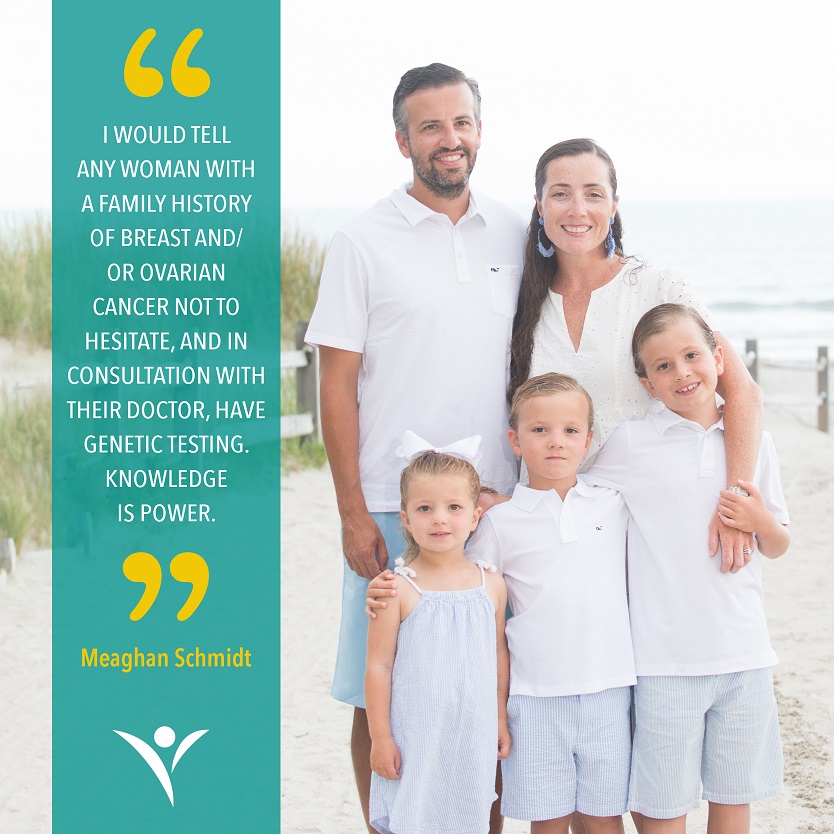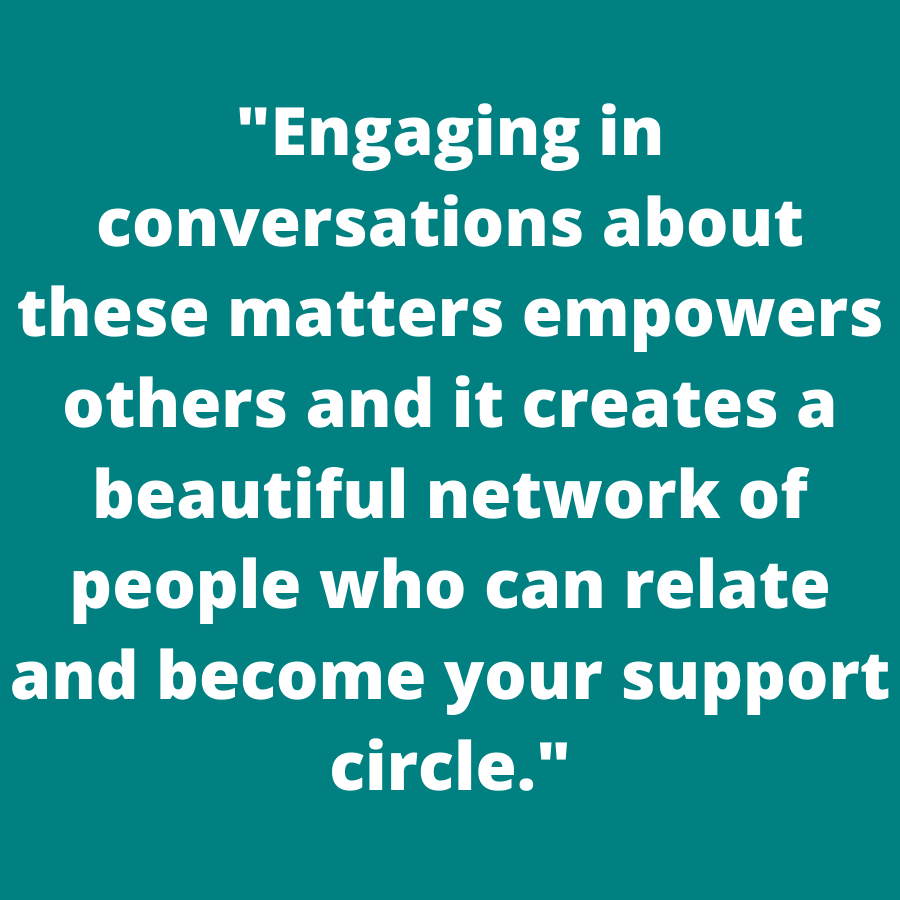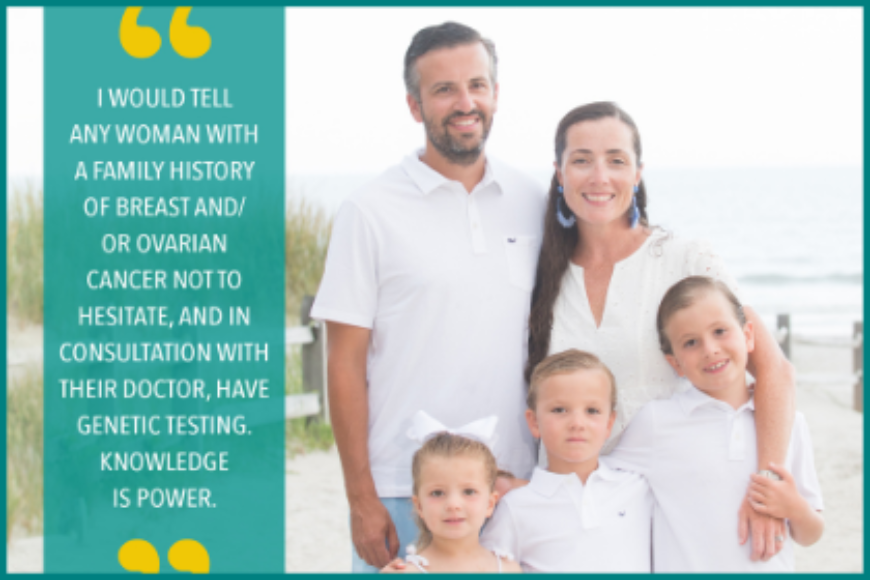Knowledge is Power

I always say timing is everything and knowledge is power.
In 2017, Tina’s Wish hosted a Lunch and Learn at the New York AlixPartners office where I am a consultant. Dr. Douglas A. Levine from NYU Perlmutter Cancer Center came to speak, and he covered so much information that enlightened not only me but all my colleagues who attended. He explained that ovarian cancer has no early detection test and that the disease typically begins in the fallopian tubes. He also went over analyzing one’s personal risk for developing ovarian cancer, what the BRCA mutations are as well as the options for women who learn that they are at a higher risk for developing ovarian or breast cancer. I felt empowered with knowledge after the event, yet I had no idea how applicable the information would soon become to my own personal life.
A few weeks after I attended the Lunch and Learn, my mom received a letter notifying her of a family member’s recent cancer diagnosis and BRCA genetic mutation so that my mom had the information in case she too wanted to get tested. My mom was of course scared, but I explained to her that having the BRCA genetic mutation is not a cancer diagnosis, it just informs you that you are at a higher risk of developing breast and/or ovarian cancer. She was tested at Memorial Sloan Kettering (MSK) and learned that she too was positive for the BRCA genetic mutation.
My mom was 62 at the time and decided that the best decision for her was to undergo a salpingo-oophorectomy (removal of the ovaries and fallopian tubes) since there is no early detection for ovarian cancer and the disease is so devastating. When her doctor at MSK performed her surgery, she initially said that everything looked good. Then the pathology report came back showing cancerous cells that were not only in her ovaries but also on her peritoneal lining. After this discovery, she underwent a full hysterectomy, endured chemotherapy treatments and thankfully is cancer-free today.
Around the time that my mom was diagnosed with cancer I decided that I wanted to get tested for the BRCA genetic mutation. I was pregnant with my third child at the time but given the recent events I felt I needed to know my own genetic story. Sure enough, I too learned that I inherited the BRCA mutation.
I kept thinking back to that Tina’s Wish Lunch and Learn. The information from that day truly helped me frame my mindset. I kept thinking “knowledge is power” and I told myself “Meaghan, you DON’T have cancer, but you need to be more proactive in monitoring and taking action with this information.”
I gave birth to my daughter and the following year I had my fallopian tubes removed. Once I turn 45 years old (assuming I have no issues between now and then), I am going to move forward with a full hysterectomy. In the meantime, because I’m BRCA positive, and my family history of ovarian and breast cancer, MSK enrolled me in the high-risk breast cancer screening program. The relief of being part of this program is invaluable.
A lot of women think that when they learn they have the BRCA mutation, they have to make radical surgical decisions such as a full hysterectomy and/or double mastectomy immediately, but there are options. I am the perfect example of this, and all women should do what is best for them.

I would compare the BRCA discussion to the infertility discussion. It seems like no one ever talks about it but once you open up, people come out of the woodwork having shared a similar journey. Engaging in conversations about these matters empowers others and it creates a beautiful network of people who can relate and become your support circle. I would tell any woman with a family history of breast and/or ovarian cancer not to hesitate, and in consultation with their doctor, have genetic testing. Knowledge is power.
Honestly, for me as a mom, the testing was for my kids. I want to be here as long as possible for them. They also deserve to know this information that may impact their medical decisions.
“A lot of women think that when they learn they have the BRCA mutation, they have to make radical surgical decisions such as a full hysterectomy and/or double mastectomy immediately, but there are options.”
The most emotional part of this journey is when I’m in the waiting room at MSK and I see other women sitting next to me with their families, after clearly learning of a cancer diagnosis. I think about those women – they may be wives, mothers, surely daughters. I see the pain in their family’s eyes, and I remind myself how fortunate I am and what I need to do for myself and my family.


